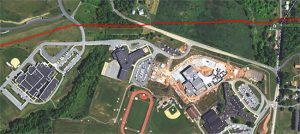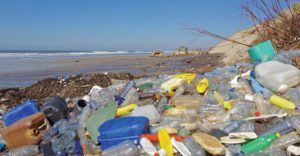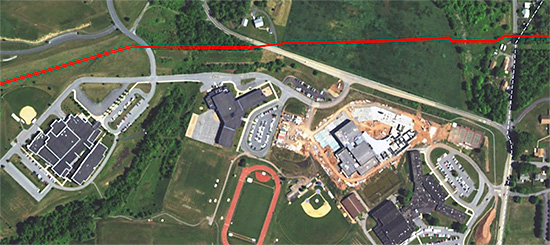
Chester County, PA (August 16, 2022) — Highly volatile hazardous liquids surge through the Mariner East pipeline system as it snakes through over 300 miles of Pennsylvania’s land. It passes by schools, under farms, and across streams. Existing lax regulations could not prevent Sunoco Pipeline L.P.’s reckless construction practices from creating sinkholes by homes and train tracks and contaminating residential water supplies, nor make Sunoco provide basic safety information to schools and communities in the zones threatened by potentially catastrophic leaks or explosions.
The Council, other local health and environmental groups, and impacted residents have worked tirelessly for years to protect the public and hold Sunoco accountable. We now applaud the Public Utility Commission (PUC) for stepping up with proposed common-sense rules to reduce the threat from hazardous liquid pipelines. Sunoco and other industry actors are trying to block the PUC’s proposed safety regulations, but the Council is meeting them at every turn, fighting Sunoco in court when local communities sue for relief, amplifying the voices of the public, and supporting the PUC’s invaluable efforts.
One of the most important proposed regulations would help prevent sinkholes and potential pipeline ruptures by requiring pipeline builders to look at the geology of a site before starting construction. Pennsylvania’s unique geology includes unstable limestone formations, called karst. These pipelines carry volatile gasses that are compressed under great pressure into liquid. If the pipelines rupture, heavier-than-air gasses would rapidly blanket the surrounding area, potentially suffocating anyone in range, and the slightest spark could ignite the highly flammable gasses. So, it seems obvious to avoid building where the ground might crumble away, leaving the pipeline unsupported. Yet Sunoco historically neglected to adequately check its construction sites, too often with disastrous results, and now fights this necessary rule.
The PUC also wants to require pipeline operators to provide local officials and emergency responders with the information they need to protect their communities in the event of an accident. The Council strongly supports providing all the information needed to local officials charged with protecting schools in the potential impact zone of a pipeline leak or other accidents. Previously, Sunoco provided such limited information to local community members that it left them quite unprepared for a pipeline disaster. For instance, the company left residents confused about when they should call “911” because a cell phone might produce a catastrophic spark.
The Legal Exposition
Buckle in for some legal exposition identifying what has happened and what still needs to happen before PUC’s proposed safety rules start protecting Pennsylvanians. Administrative regulations like these must go through several steps before being finalized, including opportunity for the public to submit comments. Here, the PUC decided to also invite a second round of comments to allow members of the public to respond to each others’ initial remarks. The rulemaking attracted comments from a wide range of interested parties, ranging from residents to local government officials to the American Petroleum Institute (the national trade association for the fossil fuel industry), and, of course, Sunoco.
In addition to raising public awareness during this process, the Council led a coalition of other knowledgeable public advocacy groups in drafting comments which (1) supported the PUC’s authority; (2) suggested ways to strengthen the proposed rules, including grounding the regulations in well established industry “best practices” which are too often ignored; and (3) bolstered the voices of local communities. In the second round, our coalition refuted the many baseless objections raised by Sunoco and their allies and provided further support for the concerns of local governments and nearby residents.
The comments and the proposed rules were then reviewed by Pennsylvania’s Independent Regulatory Review Commission (IRCC), as is standard. IRCC then prepared its own comments, referencing public comments and asking the PUC to conduct additional analysis.
What are the next steps
PUC must consider and publish a response to all of the comments before drafting a final form of the rules which it needs to send back to the IRCC. The PUC has two years from when the public comment period closed to complete the process, which makes the deadline May 12, 2024. IRCC will then discuss the rules at a public hearing and vote on whether the rules are “in the public interest.”
In the meantime, Clean Air Council will be part of the bulwark protecting the communities that brought successful challenges to some Sunoco’s harmful practices. Sunoco’s legal challenges to the PUC’s orders that resulted, combined with their public comments to the rulemaking, foreshadow their likely future judicial challenges to the safety rules. For instance, Pennsylvania law charges the PUC with ensuring that public utilities are operated safely and efficiently, making “every reasonable effort to warn and protect the public” from potential dangers. Sunoco argued strenuously for public utility status for its hazardous liquid pipelines because that allowed it to use the power of eminent domain to condemn private property to build its pipelines. Now it argues in public comments and in court that it should not need to accept the associated responsibilities. Astoundingly, in fighting these regulations Sunoco is essentially claiming that, in the event of a Sunoco-created pipeline emergency, it would be an unreasonable effort for Sunoco to 1) warn the officials in charge of keeping nearby school children safe, and 2) provide basic information public officials need to develop emergency-response plans to protect the children and others.
Clean Air Council will not let such claims stand. The Council will continue to fight Sunoco’s obstructionist, irresponsible behavior in court and through the regulatory process. It looks forward to reporting when the PUC’s new regulations are finalized and begin making Pennsylvania safer.
For more information, contact Annie Fox, Law Clerk at afox@cleanair.org.

Plastics are slowly killing life on earth. We enjoy the convenience of plastics but delude ourselves that we can dispose of them safely. We give little thought to the damage done to the environment and to public health that results from extracting the fossil fuel needed to produce and manufacture plastics. We worry about climate change but stubbornly do not make the connection between plastic production and emissions of greenhouse gases. Most people falsely believe that recycling plastics is the answer — even though the vast majority of plastics can not be recycled and there is no real market for recycled plastics. Most of us will remember that distressing video of a sea-turtle with a plastic straw stuck in its nose. That’s happening every day. Plastics don’t really break down, they turn into dangerous microplastics that we’re now consuming.
Plastics are everywhere — some are necessary, many are not. Food wrappers, cigarette filters, single-use plastic bags, plastic straws, styrofoam.
The easiest plastics to avoid are the single-use plastic items we use for convenience or out of habit. As residents, we pay a high financial cost for single-use plastics. The City of Philadelphia spends between $9 million and $12 million every year cleaning plastic bags from the streets, sewers, and bodies of water. Philadelphia alone uses approximately one billion plastic bags per year, many of which end up as litter in our neighborhoods. Pennsylvania taxpayers spend over $13 million every year just cleaning up roadside litter. This money should be spent on more important things such as public education.
The plastic and petrochemical industry mislead the public by marketing plastics as “recyclable” when in reality, less than 9% of all plastic ever produced has been recycled. There is no viable solution for plastic waste. According to the United Nations Environment Programme, 12% of plastics are burned in incinerators (increasing air pollution in communities of color where waste incinerators are typically located) and 79% of plastics are deposited in landfills, dumps or end up in the natural environment.
Nearly all plastics produced derive from oil, fracked gas, and coal — dirty, non-renewable resources. Plastics and the climate crisis go hand-in-hand: plastic production depends on fossil fuels, and fossil fuels rely on plastic production.
Another hidden cost to single-use plastics: human health. For instance, Royal Dutch Shell’s 386-acre ethane cracker—built to make plastics— is set to power up this year about 25 miles outside of Pittsburgh in Beaver County. Shell’s plant will release 159 tons per year of fine particulate matter and 522 tons per year of volatile organic compounds (VOC), according to the Council’s 2014 Health Impacts Assessment. VOCs exacerbate health conditions including asthma, cardiovascular disease, cancer, endocrine disruption, and adverse birth outcomes.
There are also terrifying new links being made between microplastics and other toxins. Scientists are finding that microplastics accumulate toxins like DDT and PCBs from trace levels that may already exist in the environment, and deliver them to wildlife and humans that eat them, often bioaccumulating through the food chain.
The Council spent more than 10 years advocating to pass a Philadelphia single-use plastic bag ban. However, Philadelphia’s plastic bag ban was delayed one year due to COVID-19 and will now go into effect on July 1, 2021.
The Council advocates for turning off the “plastics tap,” and is fighting legislation that would limit local government’s ability to regulate single-use plastic items. Representing Pennsylvania residents in court, the Council joined the City of Philadelphia, Borough of West Chester, Borough of Narberth, Lower Merion Township, and the City of Pittsburgh in a lawsuit to overturn the state’s unconstitutional preemption of municipalities from enacting or enforcing single-use plastic legislation. The Council is fighting for local residents and leaders to implement sustainable solutions locally to plastic pollution.
It’s time to end our addiction to plastic, enact local solutions, and choose to protect the environment over convenience. Start by ditching single-use plastics for Plastic Free July and spreading the word about plastic pollution.
Written by Jessica Bellwoar, Development Officer, jbellwoar@cleanair.org. For more information on the PA Plastics Preemption lawsuit contact, Logan Welde, Staff Attorney, lwelde@cleanair.org.
Tags: Plastics, recycling, waste, zero waste, litigation
HARRISBURG, PA (June 30, 2021) We celebrated a big victory in mid-June with a court ruling that restored the rights of people across Pennsylvania to challenge fracked gas projects that threaten their health and their environment! Residents of Upper Bucks County and a local municipality, West Rockhill Township, had appealed a decision of the Pennsylvania Department of Environmental Protection granting an air pollution permit to the Adelphia Gateway Pipeline project for its Quakertown Compressor Station. The Adelphia Gateway Pipeline is a gas pipeline cutting through the Lehigh Valley and the Philadelphia suburbs. Compressor stations are large, polluting facilities that push the gas along the pipeline to its destination.
The Pennsylvania Environmental Hearing Board (EHB) had thrown out the appeals, saying that it didn’t have a right to hear them, and that only federal appeals courts could hear challenges to projects that are part of interstate gas pipelines. But the EHB is designed to make it simple for everyday people to file appeals. At the EHB, parties can bring new evidence to the judges and have a trial on the new evidence. Challenges to these projects in federal court can be more complicated and don’t allow the parties to put on new evidence and have a trial. The EHB decisions had kept the township and the residents from getting their day in court and threatened to keep other people from being able to exercise their rights to appeal harmful projects, too.
With Clean Air Council’s help, the parties appealed the EHB’s decisions to the Pennsylvania Commonwealth Court. The Commonwealth Court reversed the decisions, agreeing that federal law dealing with interstate gas pipelines did not conflict with state law giving people the right to take their appeals to the EHB. The residents and the township can now move ahead with their cases at the EHB challenging the dangerous Quakertown Compressor Station, and all Pennsylvanians’ rights have been protected!
For more information contact Alex Bomstein, Senior Litigation Attorney, abomstein@cleanair.org

